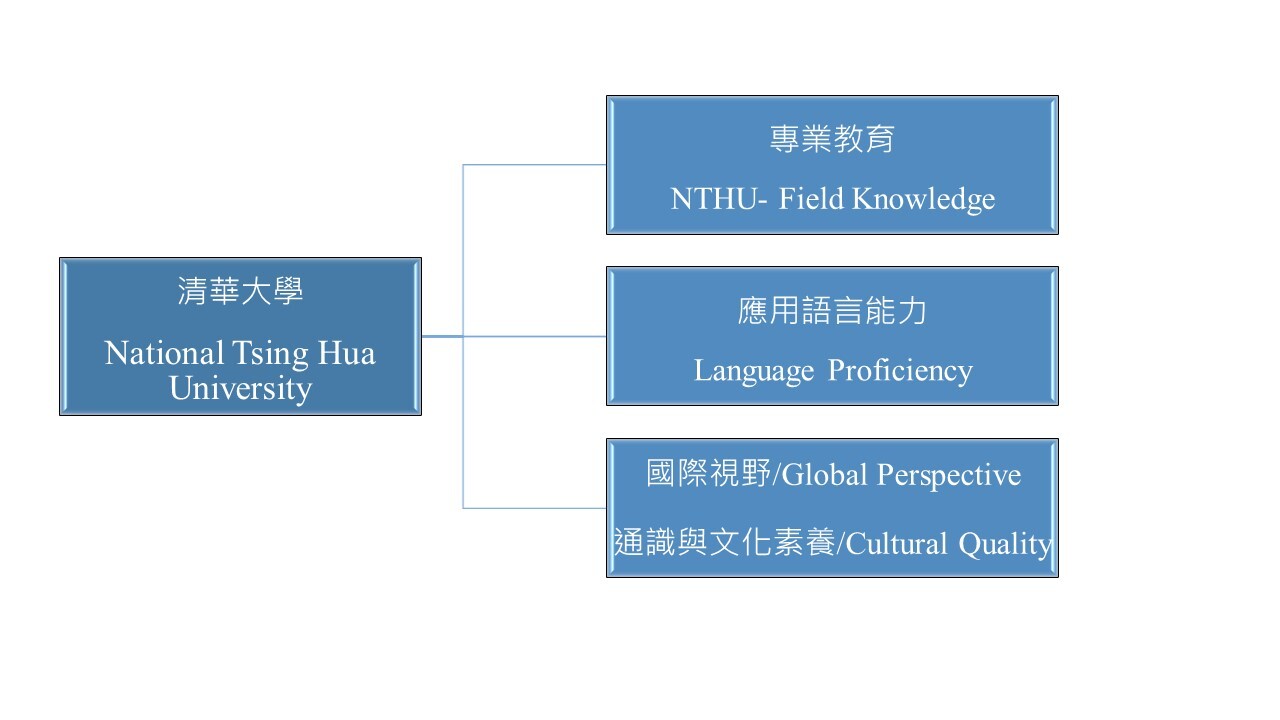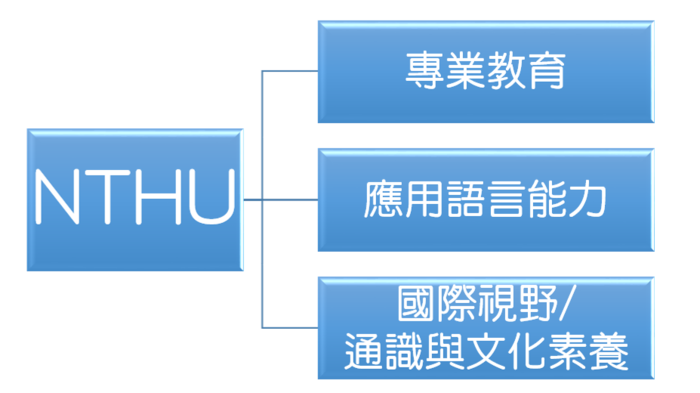本中心整合原清大語言中心業務 (英文領域學分及推廣教育)以及原清大寫作中心業務,合併為國立清華大學語文中心,期統合全校語文教學的相關資源,對內提升清華大學學生整體語文能力,對外則以清華大學語文教學研究的成果從事推廣服務。
As the merge of the NTHU Language Center (in charge of English-related credits and extension education) and the Writing Center, the newly formed NTHU Language Center aims to further integrate campus-wide resources in language education and improve the language proficiencies of all NTHU students while providing extension education to off-campus learners.
全球化的世界觀為高等教育帶來前所未有的置高點及挑戰。今天的大學,不但要教授學生專業知識能力,更肩負培養學生參與未來世界舞台的責任。培養國際化人才及大學本身之國際競爭力,是大學責無旁貸的任務。培養優秀學生、發展國際一流大學及頂尖研究中心,乃台灣教育界近年來共同努力的目標,語文教育中心的設置將可以為清華大學樹立更為清楚具體的卓越大學使命,為在「一個急遽變化且充滿挑戰的全球化世界中」,「培養未來領導社會進步的菁英」的創新才能。據此,如何結合頂尖的研究計畫與多元前瞻的課程設計,真正掌握專業研究能力及國際視野這兩項決定未來競爭力的重要領域,即為清大吸引優秀教育及研究人才與學生、養成優秀世界未來公民的優勢。尤其以清大特殊的教育條件,及高師生比,選擇致力於發展優質國際化人才深度培育計畫,將更有助於學校特色之建立。
Globalization has brought potentials for higher education alongside unprecedented challenges. Today’s universities not only have to teach knowledge but also essential skills for international collaboration. NTHU, as a critical player in our country’s education space, has long strived to cultivate the best talents and be among top universities and research centers globally. The establishment of the Language Center is a clear manifestation of that vision, for NTHU to overcome the said globalization challenges and cultivate innovative leaders that can drive society forward. By introducing courses that are intellectually inspiring and culturally diverse, we train our students to be both professionally capable and internationally adaptable, attributes that are huge traction for global talents and esteemed researchers. On top of our education prowess and excellent student-to-teacher ratio, NTHU is determined to make international competency its future hallmark.
所謂優質人才之深度培育,在此包括兩大主軸:一為專業學科之研究能力,二為國際舞台之競爭能力,兩者均為「 發展國際一流大學及頂尖研究中心」不可或缺之決定性力量。其中主軸一:專業學科之研究能力,已為清華各專業領域卓然有成之範圍,本計畫乃以主軸二:國際競爭力之發展作為目標而建構,而以英語文教育之深度與廣度為發展國際競爭力之核心,其中又以提升語文應用能力為首要工作,而以國際視野及世界公民素養之養成為進階目標,理由分述如下:
In our view, two aspects are equally vital to talent cultivation: field knowledge and international competency, and both are determining factors for a top university and research center. The first task has been carried out extensively by NTHU academic departments, with admirable results; the NTHU Language Center, on the other hand, will step up on the second task, by building international competency. Through featuring English education deep in cultural magnitude and wide in subjects, our course teaching can be applied in a wide variety of settings and endow learners with a global view and essential qualities of a global citizen. The principles that guide us are as follows:
(一) 全球化世代的英語學習,除狹義的語言技能之取得外,已提升為通識教育之一部分,成為培育國際化人才的主要工具。 而語言學習效果之評量,除一般公認之全民英檢檢定外,更應以培養學生成為能與國際社會成功互動的未來人才為標竿;2005年4月教育部明定成為台灣英語教育評量最高指導原則的歐盟國家語言教學與學習共同綱領(Common European Framework for Language Learning & Teaching, CEF)中,除提出語言學習的能力指標外,更以跨文化學習及公民素養為語言學習的終極目標。於此,對目前大學英語語言課程之深度與廣度,應有更全面性的課程規劃。
1. In an era of global exchanges, aside from the language itself, other soft skills concerning international collaboration have also been considered an essential part of general education. In Taiwan, the main tool for evaluating language proficiency is General English Proficiency Test (GEPT), but to truly become a communicator requires a more diverse skill set. In April 2005, Taiwan’s Ministry of Education adopted the EU Common European Framework for Language Learning & Teaching (CEF), which proposes that plurilingual/pluricultural competency is key to language education. That signifies the need for universities to improve on depth and scope of their language courses.
(二) 專業學科之研究成果,必然需要對國際呈現,舉凡期刊發表、參加國際會議、跨國合作計畫等等,不僅需要培養針對各領域專業之讀說聽寫之外語語言應用技巧,更須能以外語展現對本國文化價值、國際事務、跨文化議題及普世人文關懷的了解,此種能參與國際舞台的真正能力,無疑才是尖端研究人才決勝未來不可或缺,也是清華的語文教育中,可以獨樹一格、為全國高等教育表率的空間。
2. Good research findings have to be presented internationally, in formats like international journals, conferences, or as part of multinational research projects. That endeavor requires not only proficiency in foreign languages on specialized materials, both orally and in writing, but one must also possess a profound understanding of his/her own culture, international affairs, cross-cultural discourses, and humanitarian perspectives to make his/her work stand out and be relatable to global audiences. At NTHU Language Center, we aspire to cultivate the top talent and be able to stand out among higher education institutes in the country and lead by example.

